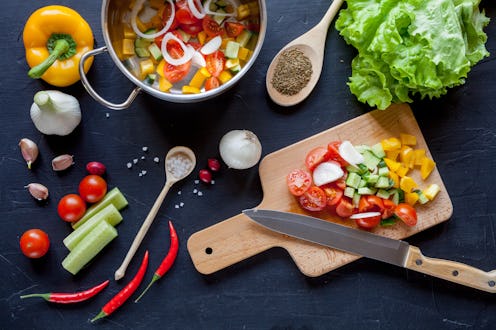(Living)
Thinking Of Going Plant-Based? Nutrition Experts Say Doing This Will Make It So Much Easier

There are a number of reasons many people are switching over to veganism these days. Research has shown that there are ethical, environmental, and health benefits to doing so, although it's important to note that it may not be the right choice for everyone. That said, if you and your doctor have determined that eliminating animal products can work with your lifestyle, there are a few plant-based diet tips that can help make your transition as smooth as possible.
From Beyoncé to Ariana Grande, there is no shortage of celebrities singing the praises of a plant-based diet — and even the hottest restaurants around have gotten in on the action. But often times it's a lot more complicated than simply removing meat and dairy from your current go-to dishes. Nutrients like protein, vitamin B12, and iron are found in meat and poultry, and while some of these can be found in fruits and vegetables, you'll probably have to do some serious reevaluating of your current diet to make sure you're still getting everything you need.
According to professionals like Los Angeles-based holistic nutrition coach Chelsea Gross, going plant-based works best when it's treated as a lifestyle change, not simply following a popular wellness trend — especially considering it can be quite challenging to anyone used to regularly incorporating animal products in their day-to-day eating habits. But if you're committed to making the change for your health, there are ways you can make it easier on yourself. Ahead, find Gross' top seven tips for going vegan in a way that won't leave you feeling deprived, and will make sure you're still getting all the good stuff.
Ask Yourself Why You're Doing It
As someone who regularly works with clients to break disordered eating habits, Gross' first bit of advice is to make sure you're making this change for legitimate reasons. "Whether it’s plant-based (paleo, keto, or anything in-between) make sure to make the switch from a place of knowledge and understanding, not just because it’s trendy," she says. "In my private coaching practice I work with women finding freedom from restriction, and no diet should make you feel restricted; so if it’s compromising your peace of mind, it’s not the right fit. You can still choose plant-based foods all the time, but it doesn’t have to be black and white."
Seek Out Inspiration
Just as you likely do when it comes to your outfits and future haircuts, you can turn to the web for inspiration for plant-based dishes that will make you excited about going vegan. "Check out Pinterest, Instagram, and even YouTube for awesome new ideas to upgrade your favorites into plant-based meal," Gross says.
Opt Out Of Prepackaged When Possible
Now that you've got your reasoning and inspiration out of the way, it's time to start stocking up. But according to Gross, one of the biggest pitfalls is grabbing prepackaged foods out of convenience and lack of experience cooking without animal products. "It’s easy to accidentally become a junk-food vegan," she says, suggesting you grab whole foods instead. "Be intentional about colorful fruits and vegetables, healthy fats like avocado and coconut, and a variety of grains, nuts and seeds — bonus if they’re soaked and sprouted for easier digestion."
Know The Ingredients
And for the times that you just can't pass up something prepackaged, Gross encourages scanning the ingredients carefully. "Just because something is plant-based or vegan, doesn’t necessarily mean it’s healthy," she explains. "Look for only ingredients you can pronounce and understand and avoid inflammatory vegetable oils (like canola and/or soybean oil) common in plant-based products, additives, preservatives or fillers (like natural flavors, gums and starches) and unnecessary sugars and sweeteners."
BYO Snacks
To avoid falling off the plant-based wagon, Gross says that it's super important to stay feeling satiated with healthy snacks. "While plant-based foods are becoming more readily available, there are still a lot of limitations nationwide, especially on-the-go," she explains. "So I suggest staying prepared with nutrient-dense and filling snack options. Some of my favorites are nut butter packets, Thunderbird bars (made of dates and nuts), dried fruit like dates and figs, and nori sheets, which are rich in anti-inflammatory omega-3’s (less common in a vegan diet)."
Start With Milk
According to Gross, swapping out milk is a simple first step if you're tiptoeing slowly into a plant-based diet. "The options are literally endless for varieties of dairy-free milks ranging from almond, walnut, pumpkin, macadamia, even tigernut milk," she says. "There are some great brands on the market, my favorite being MALK, but I also highly recommend making your own. Not only do you avoid sweetened milks or brands containing gums (which can cause GI upset and bloating) but it’s super easy, and way more delicious. A great rough recipe is one cup nuts or seeds soaked overnight in water, drained and rinsed the next day, blended with four cups filtered water (or one date, cinnamon and nutmeg) and drained through a nut milk bag (I love the brand Ellie’s Best)."
Try Beans In Place Of Animal Protein
Beans can be a great source of protein, and Gross explains that one of her favorite ways to introduce more of them into your diet is with gluten-free pastas. "There are great black bean, lentil, and chickpea pastas on the market (check out Tolerant Foods)," she says. "These are a great source of protein and fiber, and make an awesome weeknight meal with some pasta sauce and sautéed greens like spinach or kale."
This article was originally published on